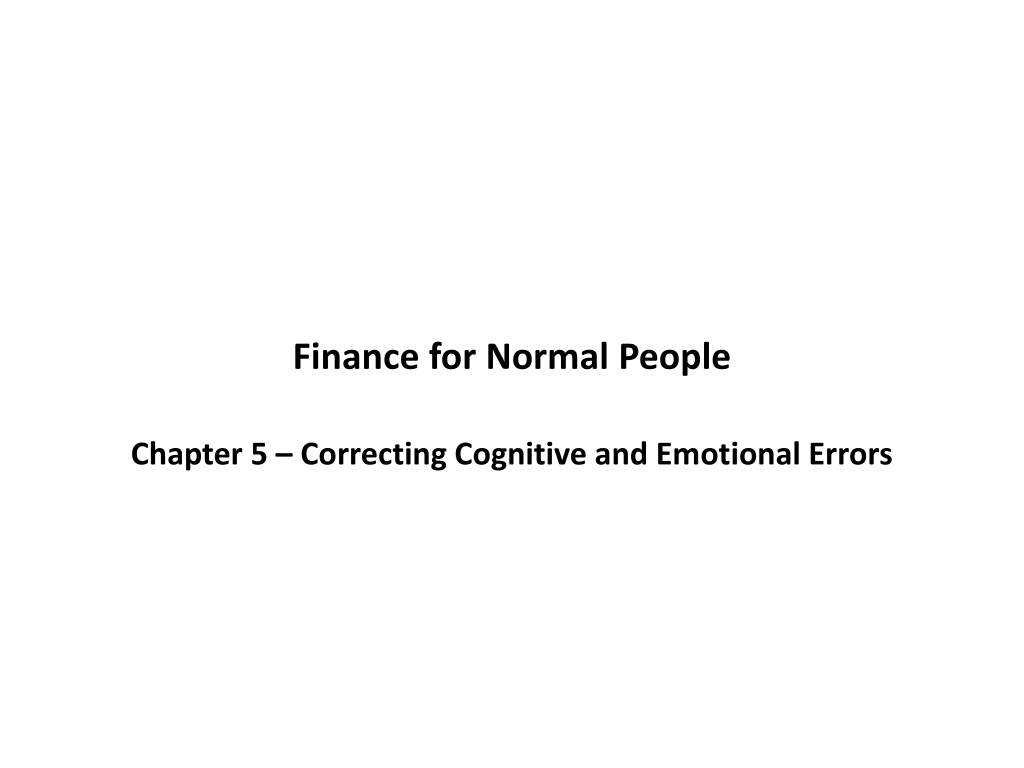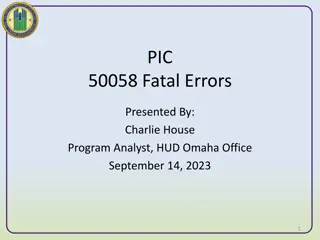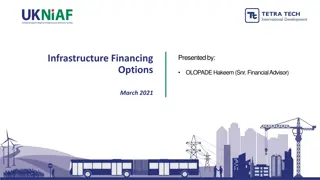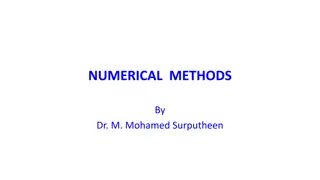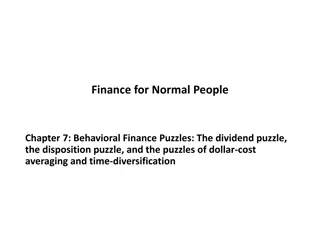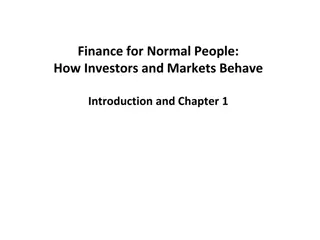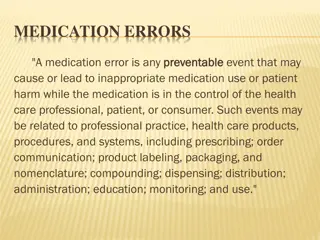Understanding and Correcting Cognitive and Emotional Errors in Finance
Human behavior and financial knowledge help correct cognitive and emotional errors in finance. Expertise allows reliance on intuition in predictable environments but requires reflective thinking in uncertain situations. Financial professionals benefit from quick feedback but face challenges with long-term outcomes. Non-experts can benefit by following expert advice to correct errors in decision-making regarding medicine, investments, and other areas.
Download Presentation

Please find below an Image/Link to download the presentation.
The content on the website is provided AS IS for your information and personal use only. It may not be sold, licensed, or shared on other websites without obtaining consent from the author. Download presentation by click this link. If you encounter any issues during the download, it is possible that the publisher has removed the file from their server.
E N D
Presentation Transcript
Finance for Normal People Chapter 5 Correcting Cognitive and Emotional Errors
Correcting Cognitive and Emotional Errors Human-behavior and financial-facts knowledge are correcting tools Investors can acquire such knowledge formally, as in investment classes, or informally, as by investment media and experience Financial experts gain their expertise over time by acquiring human- behavior and financial-facts knowledge and using the reflective System 2 to process it
Correcting Cognitive and Emotional Errors Correction by expertise Expertise allows eventual reliance on the intuitive System 1, bypassing System 2, in predictable environments such as meteorology or chess, where quick and precise feedback readily corrects cognitive and emotional errors Expertise requires explicit use of the reflective System 2 in less predictable environments where quick and precise feedback is scarce
Correcting Cognitive and Emotional Errors Correction by expertise Financial professionals, like psychotherapists and intelligence officers, know much about particular companies, patients, and international conflicts, and they may receive quick and precise feedback about short-term outcomes, but the feedback they receive about long-term outcomes is delayed, sparse, and ambiguous, promoting confidence in choices without promoting quality of choices
Correcting Cognitive and Emotional Errors Correction by expertise It makes little sense to turn all people into experts in medicine, investments, or home appliances, but it makes much sense for non-experts to correct their cognitive and emotional errors by following experts advice
Correcting Cognitive and Emotional Errors Correction by expertise Do you choose generic aspirin or Bayer aspirin? Why? Do you choose generic acetaminophen or Tylenol? Why? Do you choose index funds that aim to match the market or active funds that aim to beat it? Why?
Correcting Cognitive and Emotional Errors Correction by expertise Store-brand drugs are generic, costing less than national brands although generally equal in quality Pharmacists bought national-brand drugs less than 9% of the time while average consumers bought them 26% of the time People lacking college education were especially likely to buy national brands Health-care professionals -- including nurses and doctors -- were more likely to buy store brands than lawyers, who have the equivalent amount of education but not equal pharmaceutical expertise
Correcting Cognitive and Emotional Errors Correction by expertise Two thirds of finance professors choose index funds that deliver market- matching returns Most investors, however, choose active funds that promise market- beating returns
Correcting Cognitive and Emotional Errors Correction by expertise How do you know who s an expert? How do you know who are good plumbers? How do you know who are good physicians? How do you know who are good financial advisers or money managers?
Correcting Cognitive and Emotional Errors Correction by financial advisers Financial advisers can guide investors well, providing human-behavior and financial-facts information and correcting cognitive and emotional errors Advisers can point out the cognitive errors of availability and hindsight when mutual fund advertisements are about to steer clients into funds with high recent returns but unlikely high future returns They can point out the emotional errors of exaggerated fear when these errors threaten to steer clients into selling all their stocks after stock market crashes
Correcting Cognitive and Emotional Errors Correction by Prompting Use of System 2 We vary in susceptibility to cognitive and emotional errors and resulting investment errors Some of this variation is rooted in our genetics Genetic factors explain up to 50% of the variation in susceptibility to investment errors
Correcting Cognitive and Emotional Errors Correction by Prompting Use of System 2 Intelligence prompts us to use the reflective System 2, but the tendency to use System 2 is more closely related to disposition for reflection than to intelligence Intelligent people are better able to use System 2 to correct overconfidence and hindsight errors than less intelligent ones, but they are no better able to correct anchoring errors or overcome the resistance to realizing losses
Correcting Cognitive and Emotional Errors Correcting framing errors For undergraduate students: Make a list of as many as possible objectives and benefits of an ideal internship For graduate students and professionals: Make a list of as many as possible objectives and benefits of an ideal job
Correcting Cognitive and Emotional Errors Correcting framing errors MBA students were asked to list their objectives for summer internships Students used System 1, framing the question narrowly and listing 7 objectives on average, such as improves my attractiveness for full-time job offers and helps me develop my leadership skills
Correcting Cognitive and Emotional Errors Correcting framing errors Next, the objectives listed by all students were combined into a master list of 29 objectives Students were prompted to use System 2 to frame the question once more after reviewing the 29 objectives in the master list This time students listed 15 objectives on average, implying that engaging System 2 prompted students to add 8 objectives they considered important but were not prompted by System 1
Correcting Cognitive and Emotional Errors Correcting anchoring errors Recall the airport runway and double-decker bus experiment described in Chapter 3 People estimated the price of a double decker bus as higher when told that the length of the runway is 7,300 meters than when told that it is 7.3 kilometers. The length of the runway is the anchor in this experiment and the price of a double-decker bus is the target
Correcting Cognitive and Emotional Errors Correcting anchoring errors Anchors affect estimates of targets by highlighting features shared by the anchor and the target, and obscuring features of the target that differ from those of the anchor Air transportation is a feature of runways, whereas Ground transportation is a feature of buses
Correcting Cognitive and Emotional Errors Correcting anchoring errors Proper framing highlights differences between the features of anchor and target Making the length of runway less prominent in the evaluation of the price of a bus weakens the chain that links the length of the runway to the estimate of price of the bus
Correcting Cognitive and Emotional Errors Correcting anchoring errors Proper framing also corrects anchoring errors when it makes us consider many anchors rather than one Plausible anchors for the price of a double-decker bus, such as the price of a single decker bus, exert greater influence on estimates than implausible ones, such as the length of a runway People facing multiple anchors evaluate the plausibility of each anchor relative to the others People facing the length of a runway as one anchor for the price of a double- decker bus and the price of a single decker bus as another anchor choose the price of a single decker bus as an anchor because it is more plausible
Correcting Cognitive and Emotional Errors Correcting hindsight errors Prospective hindsight is a System 2 method that corrects hindsight errors An investor considering concentrating her portfolio in the biotechnology sector might be guided to ask: Imagine that we are a decade from now, why did biotechnology stocks yield lower returns than other stocks? Such a question elicits potential causes for failure that do not come to mind easily when using System 1
Correcting Cognitive and Emotional Errors Correcting over-precision errors What is the current level of the S&P 500 Index? What is your best estimate of the level of the index a year from now? What is your 67% confidence interval around your estimate? (Pick a pair of S&P 500 Index values such that there is a 67% probability - a 2 out of 3 chance - that the values of the S&P 500 Index a year from today would be higher than the low value but lower than the high value)
Correcting Cognitive and Emotional Errors Correcting over-precision errors The general wisdom-of-crowds, method, even wisdom-of-crowds- within oneself, can correct overprecision errors What is your best guess for the S&P 500 Index level at the end of 2020? Now assume that you are wrong. What is your next guess? The average of two guesses is generally more accurate than either guess Wisdom-of crowds is more accurate than wisdom-of-crowds-within An average of the guesses of two people is generally more accurate than an average of two guesses of one person
Correcting Cognitive and Emotional Errors Correcting self-control errors Whereas people with insufficient self-control are overly eager to indulge, people with excessive self-control are excessively reluctant to indulge Reflect on your behavior and the behavior of others Can you identify insufficient or excessive self-control in yourself and in others in financial choices and behavior and in choices and behavior outside of finance? What methods do you and people you know adjust self-control up when it is insufficient, and down when it is excessive?
Correcting Cognitive and Emotional Errors Correcting over-precision errors Properly calibrated 80% confidence intervals of future S&P 500 Index returns contain the realized return in 80% of forecasts Yet 80% confidence intervals by corporate chief financial officers manifest overprecision errors, containing the true return only 33% of the time Two methods correct overprecision errors:
Correcting Cognitive and Emotional Errors Correcting over-precision errors One splits the question into parts, asking for 10% and 50% confidence intervals before asking for those at 80% confidence levels This prompts people to use System 2 and acknowledge that an 80% confidence interval must be wider than a 10% or 50% confidence interval
Correcting Cognitive and Emotional Errors Correcting over-precision errors Another asks people to estimate confidence intervals first for one month in the future and then two months in the future before asking them to estimate confidence intervals for three months in the future This makes time explicit, highlighting the uncertainty of estimates and leading people to better calibrated confidence intervals, knowing that three-month confidence intervals are likely wider than those of two- month intervals and those for two-months are likely wider than those of one-month
Correcting Cognitive and Emotional Errors Correcting representativeness errors We commit representativeness errors when we believe in the law of small numbers, a tongue-in-cheek offshoot on the robust law of large numbers One manifestation of belief in the law of small numbers is that 6 years of beating the market are interpreted as representative of a skillful mutual fund manager as much as 30 years of beating the market
Correcting Cognitive and Emotional Errors Correcting representativeness errors Insensitivity to predictability exacerbates representativeness errors Variation in the quality of meals at a restaurant tends to be small whereas variation in the performance of a mutual fund tends to be large We can predict quite accurately the quality of future meals at a restaurant by the quality of 6 past meals, but we cannot predict nearly as accurately the future performance of a mutual fund by performance in 6 past years
Correcting Cognitive and Emotional Errors Correcting representativeness errors Consider judging the probability that a particular mutual fund manager would generate returns exceeding benchmark returns Analysis free of representativeness errors guides us to examine both representativeness information about the returns of this particular fund relative to its benchmark, and base-rate information about the returns of all funds relative to their benchmarks
Correcting Cognitive and Emotional Errors Correcting representativeness errors Judging by representativeness information alone, we might be tempted to conclude that a manager who beat the benchmark 6 years in a row provides clear evidence of skill at generating returns exceeding benchmark returns After all, the chance of 6 heads in 6 flips of a coin is only one in 64. But once we note that base-rate information indicates that few mutual fund managers beat their benchmarks consistently over years and know that this fund manager is one among hundreds or thousands of fund managers in the population of funds, we understand that it is likely that there would be lucky fund managers who beat their benchmarks 6 times in a row as there are lucky coin flippers who flip 6 heads in a row
Correcting Cognitive and Emotional Errors Correcting representativeness errors Yet investors, even professional institutional investors, continue to neglect base-rate information Institutional investors prefer active money management over passive money management In particular, institutional investors trust their judgment about the application of representativeness information in identifying skilled money managers Stated reasons for preferring active management include whether a handful of skilled active managers can be identified and combined to generate market-beating returns In contrast, stated reasons are only vaguely associated with base-rate information about the performance of the average manager
Correcting Cognitive and Emotional Errors Correcting representativeness errors Peter Lynch managed Fidelity s Magellan fund during the 13 years from 1977 to 1989 Representativeness information includes the observation that Lynch beat the S&P 500 Index in 11 of the 13 years Base-rate information includes the observation that if 500 coin flippers flip 13 coins each, the winner will on average flip 11.63 heads
Correcting Cognitive and Emotional Errors Correcting confirmation errors Consider 4 cards (Wason s question) D F 7 5 Assume that each card has a letter on one side and a number on the other Which card or cards should you turn over to find if they satisfy the rule: If a card has a D on one side, then it has a 7 on its other side
Correcting Cognitive and Emotional Errors Correcting confirmation errors Most people choose to turn over the card with the letter D on one side, searching for confirming evidence Some choose to turn over the card with the letter F on one side or the one with number 7
Correcting Cognitive and Emotional Errors Correcting confirmation errors The correct answer calls for turning over the card with the letter D on one side to see if it confirms the rule by having the number 7 on the other But the correct answer also calls for turning over the card with the number 5 on one side to see if it disconfirms the rule by having the letter D on its other side
Correcting Cognitive and Emotional Errors Correcting confirmation errors Some choose to turn over the card with the letter F on one side or the one with number 7 These can offer neither confirming nor disconfirming evidence because there in nothing in the statement relating to what is on the other side of cards with the letter F, and there is nothing in it indicating that cards with letters other than D on one side cannot have the number 7 on the other But few choose to turn over the card with the number 5 that can offer disconfirming evidence by having the letter D on the other side
Correcting Cognitive and Emotional Errors Correcting confirmation errors Proper framing, such as by the box of positive and negative hits and false positive and negatives or by concrete and familiar settings, helps correct confirmation errors The frame of Wason s question is abstract and unfamiliar Consider a concrete and familiar analog to Wason s cards in four cards marked: Beer Diet Coke 23 Years Old 19 Years Old Which card or cards would you turn over to find if they satisfy the rule: If a person drinks beer, then that person is 21 or older ?
Correcting Cognitive and Emotional Errors Correcting confirmation errors More than abstraction and unfamiliarity make the frame of D, F, 7, 5 more prone to confirmation errors than the frame of Beer, Diet Coke, 23 Years Old, 19 Years Old. Evolutionary psychologists argue that the second frame activates a cheater detector module embedded into our brains by evolution That module is proficient at detection of cheaters on social contracts Consider the social contract rule If an employee gets a pension, then that employee must have worked for the firm for at least 10 years You face four cards: Pension No Pension Worked 12 Years Worked 8 years Some people were told that they are the employer in the story whereas others were told that they are the employee. Those told that they are the employer were better at detecting cases where the employee cheated, receiving a pension despite having worked only 8 years, whereas those told that they are the employee were better at detecting cases where the employer cheated, providing no pension to an employee who worked for 12.
Correcting Cognitive and Emotional Errors Correcting confirmation errors More than abstraction and unfamiliarity make the frame of D, F, 7, 5 more prone to confirmation errors than the frame of Beer, Diet Coke, 23 Years Old, 19 Years Old The second frame activates a cheater detector module embedded into our brains by evolution That module is proficient at detection of cheaters on social contracts Consider the social contract rule If an employee gets a pension, then that employee must have worked for the firm for at least 10 years You face four cards: Pension No Pension Worked 12 Years Worked 8 years
Correcting Cognitive and Emotional Errors Correcting confirmation errors Some people were told that they are the employer in the story whereas others were told that they are the employee Those told that they are the employer were better at detecting cases where the employee cheated, receiving a pension despite having worked only 8 years Those told that they are the employee were better at detecting cases where the employer cheated, providing no pension to an employee who worked for 12
Correcting Cognitive and Emotional Errors Correcting confirmation errors Double-blind tests of candidate drugs in the pharmaceutical arena counter confirmation errors Some patients receive the candidate drug whereas others receive placebos Both physicians and patients are blind to whether the administered drug is the candidate drug or not Health improvements in patients who receive the candidate drug are confirming evidence of its effectiveness. Equal health improvement in patients who receive the placebo are disconfirming evidence, casting doubt on the candidate drug s effectiveness
Correcting Cognitive and Emotional Errors Double-blind tests are not always feasible Consider a university admissions committee admitting only candidates who meet the selection criteria A truly fair examination of the hypothesis that the selection criteria are valid requires admission of such candidates despite failure to meet the selection criteria, so as to ascertain their eventual success under conditions identical to those of candidates admitted because they have met the selection criteria (Many object to double-blind tests of medicines because it deprives some of a medicine, giving them a placebo instead)
Correcting Cognitive and Emotional Errors Correcting availability and representativeness errors Quantitative models are powerful correcting methods Michael Lewis s book, Money Ball, describes the application of such models to evaluating professional baseball players where intuitive evaluations are biased by cognitive errors Recruiters and team managers commonly commit availability and representativeness errors by overweighting players easily available recent performance and perceived similarity to other players
Correcting Cognitive and Emotional Errors Quantitative models and algorithms regularly outperform human judgment A linear model for selecting applicants to a graduate program combines student performance with other features such as grade-point-average, Graduate Record Examination scores, quality of undergraduate university attended, and strength of recommendation letters, and specifies the weight of each feature for the best forecast of the performance of future students
Correcting Cognitive and Emotional Errors An investment model may be based on the inputs of profitability, financial stability, susceptibility to bankruptcy, and margin of safety The model simplifies the investment selection process and helps avoid cognitive errors that might degrade the selection process Yet people regularly prefer human judgment over quantitative models and algorithms, and lose confidence in algorithmic forecasters faster than they lose confidence in human forecasters after seeing them make the same mistake
Correcting Cognitive and Emotional Errors Correcting insufficient self-control Love of projected older selves can bolster insufficient self-control People who saw computer pictures of their faces as they would look when old were more likely to choose future monetary rewards over immediate ones Prompts encouraging consumers to consider the future outcomes of their present decisions were also effective among people with insufficient self-control
Correcting Cognitive and Emotional Errors Correcting insufficient self-control Commitment devices offer incentives that bolster self-control These includes placing savings in accounts that prevent premature withdrawals, imposing deadlines with penalties to deter procrastination on coursework, and placing money in accounts that would be forfeited if we commitments are not fulfilled
Correcting Cognitive and Emotional Errors Correcting hindsight regret errors Consider receiving a coffee mug as a gift that is yours to keep. How much would you be willing pay for such a mug if you were to buy one? And how much would you ask for the mug if you are to sell it? If you are like most people you are likely willing to pay a lower amount, say $6, for the mug if you are to buy it than the amount, say $10, you ask for the mug you own if you are to sell it. We know this tendency as the endowment effect. It is as if the act of being endowed with an item enhances the item s worth in the eyes of a person who owns it. But what rationale underlies the endowment effect? Correction of the endowment effect illustrates the use of System 2 to counter emotional errors, specifically the emotional error of regret. We do that by reducing our sensitivity to the pain of regret by thinking like a trader.
Correcting Cognitive and Emotional Errors Correcting insufficient self-control Commitments with SticKK.com include losing weight, cleaning a living space, learning Japanese, waking up on time, and using absolutely no drugs (cocaine, opiates, or alcohol) Users commit an amount money that would go to a group they abhor if they fail to fulfill their commitments Referees verify that commitments have indeed been fulfilled before money is returned to users. One satisfied user wrote: "I have lost over fifty pounds to date with my Stickk.com contract. I've lost weight before, but I have never been as motivated as I have been with Stickk
Correcting Cognitive and Emotional Errors Correcting insufficient self-control Temptation bundling bundle wants such as reading the Hunger Games, with shoulds such as going to the gym People in a temptation bundling group could listen to iPods containing four audio novels of their choice only when exercising at the gym Other people could listen any time but were encouraged to listen only while exercising Yet other people received a gift certificate whose value is approximately equal to the cost of borrowing four audio novels People in the first group were most likely to exercise at the gym, followed by people in the second group and people in the third
